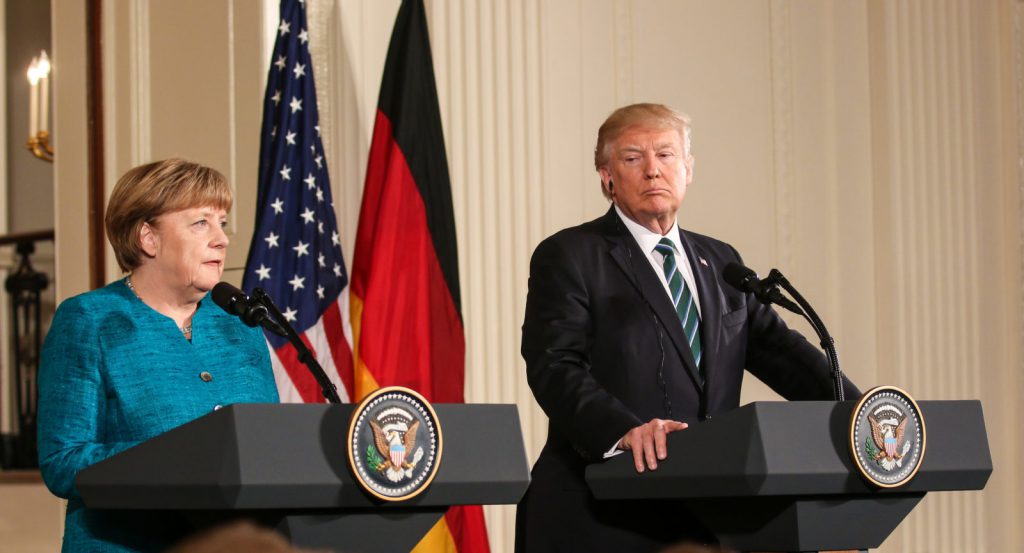
Published February 18, 2019
Democrats frequently decry President Trump for purportedly weakening our ties with our European allies. But a recent security conference in Germany shows that tensions between the United States and Europe would likely recur under any Republican president — and perhaps under Democratic leadership as well.
The fact is that Republican orthodoxy is at odds with many commonly shared European viewpoints. Take climate change. Europeans of all political stripes share a commitment to the Paris Agreement and are willing to pursue tax and regulatory policies to reduce greenhouse-gas emissions. German Chancellor Angela Merkel, for example, recently announced that Germany would phase out all coal-fired electricity plants by 2038, forcing utilities to find new sources for about half of Germany’s electricity output. No Republican president would come even close to matching that, yet European pressure to move policies in their direction will only intensify.
Vice President Pence’s presentation at the 2019 Munich Security Conference shows how starkly the European and Republican worldviews collide. He staunchly defended the Trump administration’s withdrawal from the Paris Agreement. He criticized Britain, France and Germany for staying in the Iranian nuclear deal, from which Trump has withdrawn the United States. He called on the European Union to recognize Juan Guaidó as Venezuela’s rightful president. He defended the administration’s tariffs on China and its insistence that all NATO members spend at least 2 percent of gross domestic product on defense and 20 percent of that spending on equipment procurement. And in each case, he was in stark opposition to the desires of a significant number of our allies.
Most, if not all, of these policies would be pursued by any conceivable Republican president. Sen. Marco Rubio (R-Fla.), for example, has been a leader in pushing for the recognition of Guaidó as president and the removal of the Maduro regime from power. Rubio is also one of the Senate’s leading China hawks, calling repeatedly for an aggressive federal policy to combat unfair Chinese trade practices and prevent China from overtaking U.S. leadership in military technology. Sen. Ted Cruz (Tex.), one of Trump’s final Republican opponents in 2016, was as staunchly opposed to the Iranian deal and Paris Agreement as Trump. Europeans might wish for a return to the kinder, gentler days of George H.W. Bush-led Republicanism, but that is simply not where today’s GOP stands.
Former vice president Joe Biden’s speech was, in contrast, music to European ears. He praised efforts to fight climate change and expressed support for multilateral action. He also called U.S. border policy “an embarrassment” and told the assembled leaders that the United States “will be back,” with “back” clearly serving as code for “more in tune with your views.”
But even Democratic leadership might rest uneasily with European desires. It is painfully clear that the phrase “American leadership” means something different on both sides of the Atlantic. For many Europeans, it seems to mean the United States following Europe’s lead on relations with the Middle East and less developed regions of the world while Europe allows the United States to defend it against Russia. The contrast in burden-sharing was difficult to manage even under the Obama administration, which failed to persuade Germany, Italy and other European countries to increase their defense spending even while making concessions in areas of European priority. It will be increasingly hard to manage under any Democratic administration that seeks to shift shrinking U.S. military resources to combat China’s rise in the Pacific.
Democratic desires to significantly raise domestic spending will also place pressures on the European alliance. The United States has always spent more on defense than its European allies, even during the Cold War. That differential helped us to take primary responsibility for European defense while maintaining a global presence. If the United States becomes more like Europe in terms of domestic spending, however, it will likely have to reduce its military to pay for that. That will leave European allies even more exposed to any Russian threat, forcing them to deal with the identical unpleasant choices Trump is pushing them to make.
Trump’s particular concerns with NATO and the trade imbalance with Germany have surely contributed to the current malaise in the U.S.-European alliance. But our interests have been diverging for decades, and the difference in worldviews between Republican voters and continental Europeans is especially hard to reconcile.
Our marriage with Europe is on the rocks no matter who leads us. Without serious and difficult communication and compromise from both sides, further estrangement is likelier than renewed devotion.
Henry Olsen is a Washington Post columnist and a senior fellow at the Ethics and Public Policy Center.





